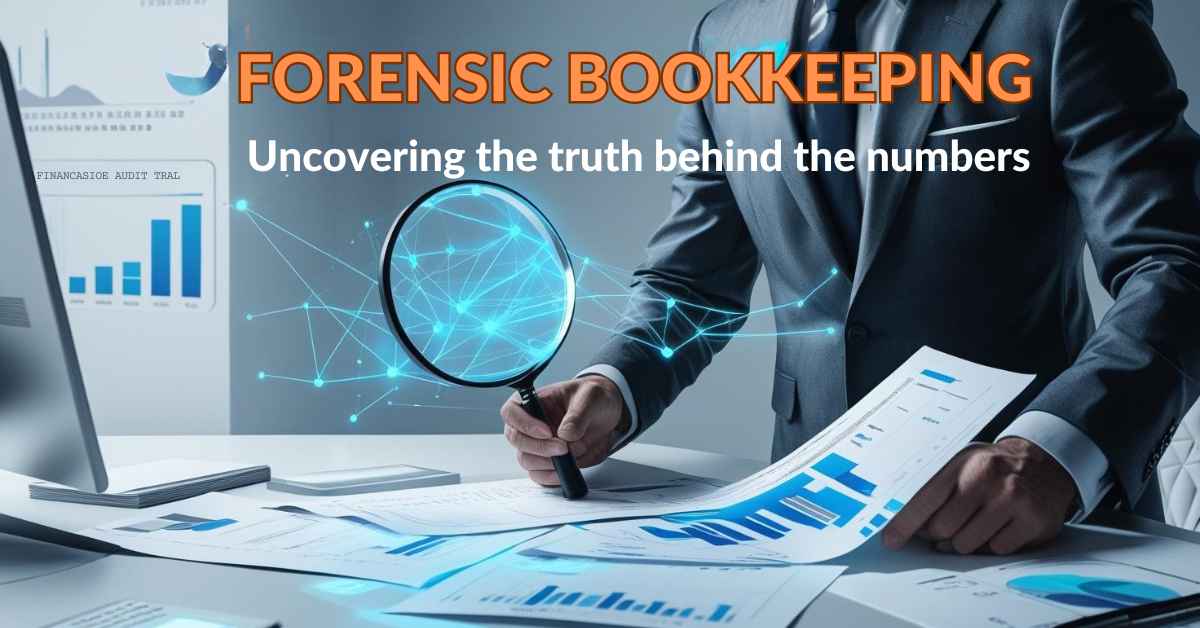Forensic bookkeeping has become an integral part of risk mitigation and fraud detection in the modern era of business transparency and data integrity. With the rise of sophisticated financial crimes expected in 2025, the demand for specialized forensic bookkeepers is set to increase. Whether you’re an entrepreneur, an accountant, or a part of the legal profession, knowing the capabilities of forensic bookkeeping can help safeguard an organization and promote ethical financial dealings.
What Is Forensic Bookkeeping?
Forensic bookkeeping is the practice of analyzing financial documents to find irregularities and reconstruct events through transactions to provide legal evidence if necessary. Unlike traditional bookkeeping, which centers around documenting daily transactions in an orderly manner, forensic bookkeeping is about analyzing an organization’s financial data to find disguised fraud or irregularities.
Forensic bookkeepers aid in legal cases around financial fraud, theft, and even divorce settlements. Forensic bookkeeping utilizes an audit trail and reconstructs financial data with accuracy and neutrality. These experts provide vital evidence in legal disputes, which makes their work invaluable.
Forensic Bookkeeping vs. Forensic Accounting: What’s the Difference?
Forensic bookkeeping and forensic accounting are often mixed up; however, both are important to separate functions to aid the frame of a financial investigation.
Forensic bookkeeping focuses on recordkeeping and following a trail of transactions to identify errors. Forensic accounting has a broader financial scope, which includes expert witness testimony and other advanced valuation and estimation services.
In essence, forensic bookkeeping lays the foundation that forensic accountants use to develop their legal arguments or litigation support. Ultimately, both aid in uncovering financial inconsistencies.
Core Principles and Techniques of Forensic Bookkeeping
To achieve their goals, forensic bookkeepers are equipped with systematic methods of investigation and accounting disciplines. Below are the core techniques central to forensic bookkeeping:
1. Audit Trails
Each financial transaction captures certain data. Well-maintained audit trails assist forensic bookkeepers in tracking the entry to the final report.
2. Tracing Transactions
This involves identifying the relationships between different accounts, agencies, and clients to uncover suspicious transactions.
3. Data Sampling and Testing
Forensic bookkeepers can identify certain trends and deviations in larger data by examining the samples.
4. Examining Financial Statements
Carefully analyzing balance sheets, income statements, and cash flow statements reveals discrepancies like overblown revenue figures or underreported liabilities.
5. Digital Forensics
As companies continue to digitize business processes, the need to analyze metadata, timestamps, and even deleted business records is critical to forensic bookkeeping.
Common Use Cases and Real-World Applications
Commonly, forensic bookkeeping caters to business stakeholders, the court of law, law enforcement, and even regulatory bodies. Here are some of the most notable real-world applications:
Fraud Detection
Through tracing suspicious activities or anomalies in the records, forensic bookkeepers are able to identify schemes of embezzlement or misappropriation of assets.
Divorce and Other Marital Conflicts
Forensic bookkeeping finds application in contentious separations by assisting in the identification of undisclosed or misreported assets, incomes, and liabilities.
Corporate Conflicts
Forensic bookkeeping settles disputes when conflicting parties contest the fairness of profit allocation and partner share value by providing an objective examination of the pertinent finances.
Tax Audit and Fraud Investigation
Forensic specialists are relied upon by governments and tax practitioners to reveal undisclosed income, “off the books” income and spending, and tax return fraud.
Bankruptcy
Forensic bookkeepers assess the legitimacy of bankruptcy claims by analyzing spending and asset movement patterns, evaluating expenses, and reviewing asset records before the filing.
Important Skills Needed for A Forensic Bookkeeper
Becoming a forensic bookkeeper is not for everyone. It requires a sharp intellect paired with technical proficiency as well as strong morals. Here are some of the skills required:
Critical Thinking Skills
A forensic bookkeeper handles every dataset with suspicion, a sense of curiosity, and a unique problem-solving approach.
Attention to Detail
Missing a single transaction could dismantle an entire investigation. Bookkeepers and detectives must exhibit the highest levels of precision.
Knowledge of Financial Laws
Understanding and keeping up with local and federal laws, tax laws, and fraud laws are integral to this position.
Communication and Report Writing Skills
Bookkeepers and detectives must have the ability to simplify complex data and provide well-structured reports that can be presented in courts and other legal institutions.
Ethical Integrity
Due to the nature of the investigation, the forensic bookkeeper must be an expert in maintaining confidentiality as well as impartiality.
In 2025, Forensic Bookkeeping is Driven By Innovative Tools and Technologies
The digitization of forensic bookkeeping is a notable trend. In 2025, the landscape is driven by tools that provide accuracy, automation, and scalability:
IDEA and ACL Analytics
These tools enable the mining of large data sets for trends, duplicates, and even outliers.
QuickBooks Forensic Add-Ons
These are specialized bespoke tools for extracting access logs, unposted entries, and even historical data.
Blockchain Tracing Tools
These tools enable the tracking of cryptocurrency and the flow of digital assets using forensic and blockchain explorers.
AI-Based Fraud Detection
Fraudulent acts can be easily detected using machine learning models that look for uncommon patterns and anomalies.
Data Visualization Tools
Tableau and Power BI are examples of tools that can transmute court report data into charts that are easier to understand.
Why Forensic Bookkeeping is a Necessity in 2025
Ignoring discrepancies is the fatal flaw for most businesses. This is particularly true in 2025.
Fraud Prevention
Lurking behind every corner is fraud, but suspicious behavior can be detected early and prevented in most cases, saving a business a fortune.
Strengthened Internal Controls
Internal forensic auditors can tighten security by identifying loopholes and providing recommendations. By doing so, sensitive information is kept safe. These internal auditors detect and prevent security breaches.
Legal Protection
In court, accurately and poorly defended financial records can lose or win the case. Accurate financial data is essential for any business security.
Enhanced Transparency
Investors and regulators have more confidence and peace of mind when they work with organizations that maintain clear and traceable company records.
EasyFiling’s Approach to Forensic Bookkeeping
EasyFiling recognizes that every financial investigation demands confidentiality, specialized knowledge, and quick action. We provide forensic bookkeeping with the utmost discretion and with hands-on investigative knowledge of the field.
Expert Team
Our EasyFiling team of professionals includes licensed CFEs and CPAs, as well as data analysts with extensive training and experience working on intricate financial matters.
Confidentiality and Precision
Each case is handled with the highest confidentiality and care to detail.
Integrated Services
EasyFiling simplifies bookkeeping. We provide tax compliance, legal coordination, and other integrated services all in one place.
When to Hire a Forensic Bookkeeper: Red Flags to Watch
If it is difficult to determine when to utilize forensic services, you can consider these alarming signs:
Unexplained Financial Discrepancies
Deeper problems might exist behind gaps in your ledger and mismatched entries.
Suspicious Employee Behavior
Frequent absences, protective over-guarding of account access, or unusual spending can all be concerning changes.
IRS Inquiries or Tax Notices
The need for a forensic examination is often indicated through sudden audits or tax disagreements.
Partner or Shareholder Disputes
In heated financial disputes, forensic bookkeeping can provide objective evidence and reasoning.
Conclusion: Use Forensic Bookkeeping to Protect Your Financial Integrity
Forensic bookkeeping is a vital tool that instills responsibility and offers transparency that is desperately needed in the complicated and risky landscape of finances. Forensic bookkeeping provides a sensible and systematic way to navigate the legal turbulence, keeping the business fraud-free while also maintaining financial precision. By 2025, with the correct attitude, professionals, and tools, businesses will be able to safeguard their valuables, settle disputes, and set the stage for enduring expansion.
Ready to take control of your financial integrity? Partner with EasyFiling and experience world-class forensic bookkeeping tailored to your business needs.
File Your LLC Today
25$ off with a coupon
Lock in EasyFiling's transparent rates and get lifetime compliance support at no extra cost.
Get Started Now







